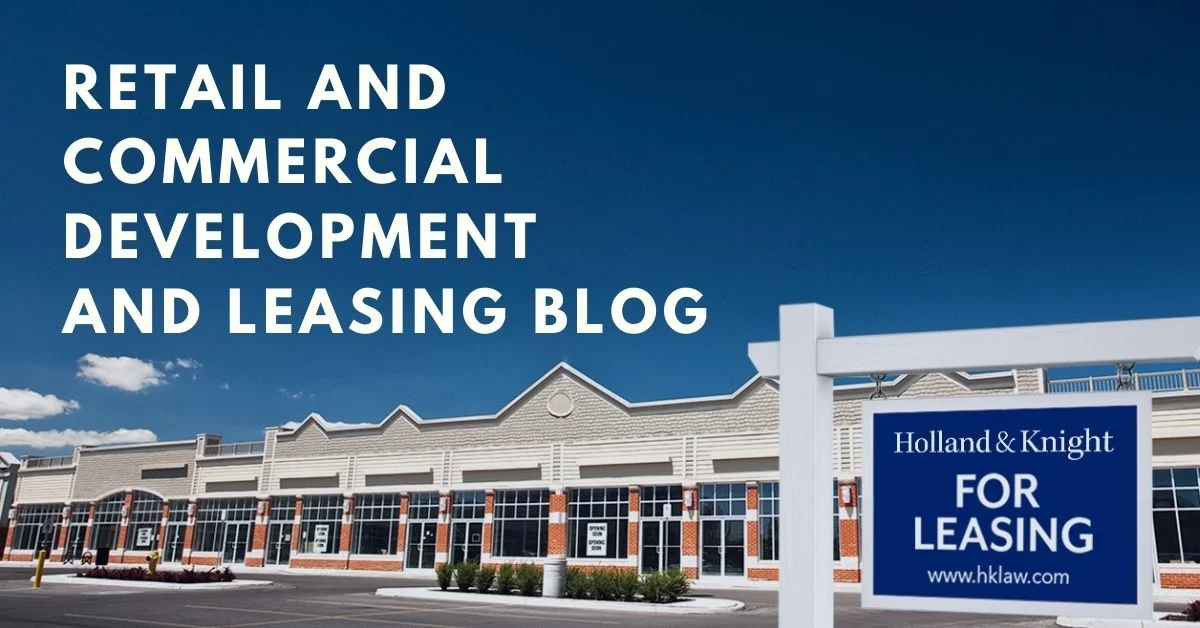The Real Estate and Corporate Restructuring Connection, Plus Retail Restructuring Trends

The transition to online shopping, interest rate increases, labor costs, maturing debt and rising inflation have collectively taken a significant toll on the retail industry, contributing to store closures and a growing number of bankruptcy filings by retail companies in recent years. Nearly 30 retailers sought bankruptcy protection in 2023. Some retailers have even filed for bankruptcy twice.
Real estate leases play a significant role in a retailer's bankruptcy process. Commercial leases, statutorily termed "unexpired leases of non-residential real property," are subject to seemingly clear mandates set forth in a section of the U.S. Bankruptcy Code relating to "executory contracts." While the Bankruptcy Code does not explicitly define "executory contract," most courts have adopted the definition as "a contract under which the obligation of both the bankrupt and the other party to the contract are so far unperformed that the failure of either to complete performance would constitute a material breach excusing the performance of the other."
When a tenant files for Chapter 11 bankruptcy, any leases that have not yet expired or otherwise been terminated become part of the tenant's bankruptcy estate. During bankruptcy, retail tenants must fully comply with lease terms until and unless that lease is rejected, but rely on the Bankruptcy Code-afforded rights to assume, reject or "assume and assign" their unexpired, unterminated leases as a source of leverage for strategic renegotiation.
When a tenant assumes its lease, that lease remains in effect. Upon assumption of a lease, the tenant must promptly cure all outstanding amounts owed to the landlord. Leases are often renegotiated prior to assumption to make the terms more economically advantageous and sustainable to the tenant's business. This approach is most common in Chapter 11 bankruptcies.
When a tenant rejects a lease, the tenant is deemed to be in breach of the lease as of the date immediately before the Chapter 11 case's filing date. That relation back provision leaves the landlord with a prepetition general unsecured claim – the kind of claim proverbially referred to as 10 cents on the dollar claims but of which many retail Chapter 11 cases receive an even lower dividend – equal to the amount of any prepetition unpaid rent, plus a "rejection damages" claim. The rejection damages claim, also a deemed prepetition general unsecured cents on the dollar claim, is equal to the future rent that would have been received had the lease not been rejected, capped at the greater of one year's rent or 15 percent, not to exceed three years, of the rent due for the remainder of the lease term.
The landlord to a rejected lease may, in addition, assert an administrative claim – the highest priority unsecured claim – for amounts that came due but were unpaid during the tenant's post-petition occupancy of the leased space. Although allowed administrative claims are entitled to full payment as a condition to the tenant confirming a Chapter 11 plan, recent history reveals no shortage of "administratively insolvent" retail Chapter 11 debtors, where there were insufficient funds at the end of the case to pay even administrative claim holders.
The Bankruptcy Code also provides that a retail tenant may "assume and assign" its lease to another party interested in buying the tenant's business or interest in the leased premises. Major retailers tend to be tenants under leases for prime, valuable real estate locations, and older leases are sometimes listed at negotiated rental rates that fall below market. All landlords have an entitlement to "adequate assurance of future performance" by a tenant-proposed assignee. Shopping center landlords' adequate assurance rights include protections relating to percentage rent, radius restrictions and tenant mix. A retail tenant's lease is most likely to be purchased by the current landlord, another retail tenant or a purchaser of tenant's business.
A debtor tenant must elect whether to assume, reject or assume and assign its leases within 120 days of the bankruptcy filing, although a 90-day extension may be, and generally is, granted by the court. Any extensions beyond 210 days require landlord consent. If a debtor tenant fails to make an election within the requisite timeframe, the lease is automatically deemed rejected, and the tenant must vacate the space.
More Blogs in This Series
Part 1 – The Real Estate and Corporate Restructuring Connection, Plus Retail Restructuring Trends (You are currently reading Part 1)
